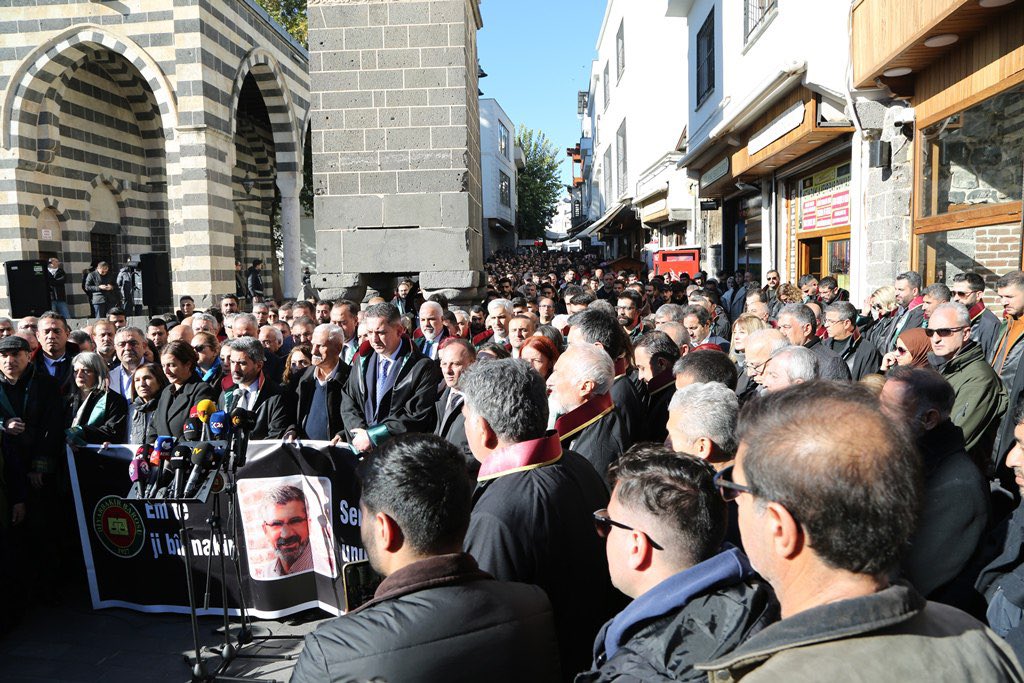Turkey’s Board of Judges and Prosecutors (HSK) has refused to consider a complaint against two prosecutors who investigated the 2015 murder of a prominent Kurdish lawyer in southeastern Turkey that alleged they were involved in witness tampering, the Media and Law Studies Association reported.
The complaint was filed against the prosecutors, identified only by the initials K.K. and U.İ., by the lawyers of Tahir Elçi, the Diyarbakır Bar Association and the Tahir Elçi Foundation.
Elçi, the former Diyarbakır Bar Association chairman and a human rights activist, was killed in November 2015 while giving a speech in Turkey’s predominantly Kurdish province of Diyarbakır during a clash between the Turkish police and members of the outlawed Kurdistan Workers’ Party (PKK). His murder still remains unsolved.
Turkish prosecutors claimed three police officers and two PKK members at the scene were suspects in the murder.
The three police officers are charged in the indictment with “causing death by culpable negligence,” which carries a prison sentence of two to six years.
Since the 1st chamber of the HSK refused to review the complaints against the prosecutors without giving any reason, the complaints were forwarded to the general council of the HSK. The prosecutors are accused of official misconduct.
The complaints were based on the statements of Deniz Ataş, a witness of the murder who is currently in prison in another case.
Ataş said during a court hearing in 2021 that he was forced by the two prosecutors and a military commander to say that the murder of Elçi was committed by members of the outlawed Kurdistan Workers’ Party (PKK), listed as a terrorist organization by Turkey and much of the international community.
He said his previous testimony in the case was not accurate. He said he was arrested in Diyarbakır’s Sur district where Elçi was murdered following the incident and subjected to acts of torture to put the blame on the PKK for the lawyer’s murder.
Fugitive Uğur Yakışır, an alleged member of the PKK, is charged with “murdering Tahir Elçi and two police officers [who died the same day],” facing multiple life sentences and an additional 45 years in prison. Another PKK member, Mahsum Gürkan, who was also allegedly involved in the murders, was later killed during clashes with military forces in the Southeast.
Ataş also wrote a letter to the Diyarbakır Bar Association in which he explained how he was pressured by the prosecutors to give a false statement against the PKK. He said he does not know Yakışır or Gürkan and whether they were involved in the murder of Elçi, in contrast to what he said at the beginning of the trial.
Meanwhile, the prosecutors who are accused of witness tampering were promoted to higher courts by the HSK.
Elçi’s lawyers argue that during the investigation, evidence in the case was inadequately collected. Despite requesting the questioning of certain police officers and officials, pointing out the lack of a crime scene investigation, their requests were rejected.
According to a 2021 report from Forensic Architecture, a London-based multidisciplinary research group, the indictment concerning the killing of Elçi that charges a Kurdish militant with murder is not realistic.
The researchers said Turkish prosecutors holding a PKK member responsible for Elçi’s murder was problematic, saying their findings clearly showed he could not have killed Elçi.
Investigating cases of state violence and human rights violations through architectural evidence and 3D technology, Goldsmith research group Forensic Architecture refuted the claims that the PKK member had killed Elçi.
The group had earlier investigated the controversial case at the request of the Diyarbakir Bar Association and released a report in 2019.
After a process of elimination, the report concluded that the prominent Kurdish human rights defender was most likely killed by one of three police officers present at the scene.
Calling for a peace rally on what turned out to be the day of his death in Sur’s historic district, Elçi said he wanted no violence, war, destruction or armed operations in the area moments before his murder.
